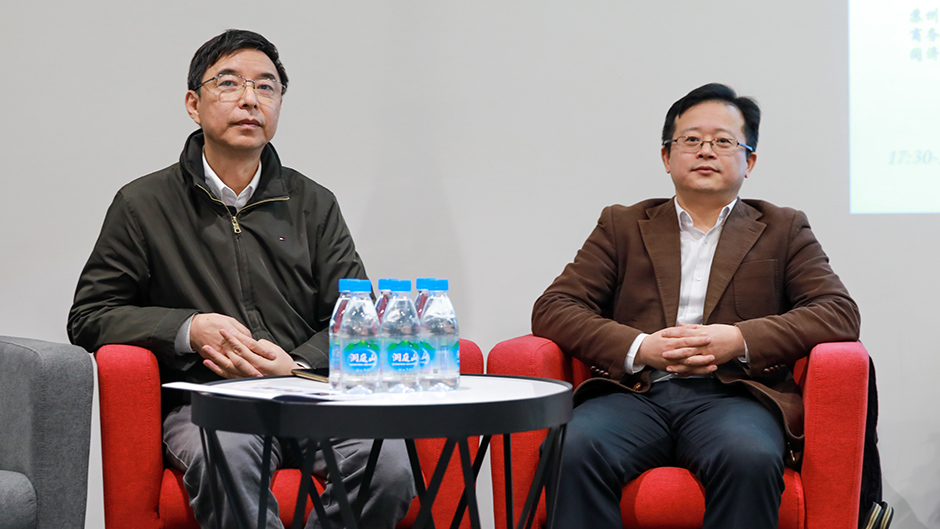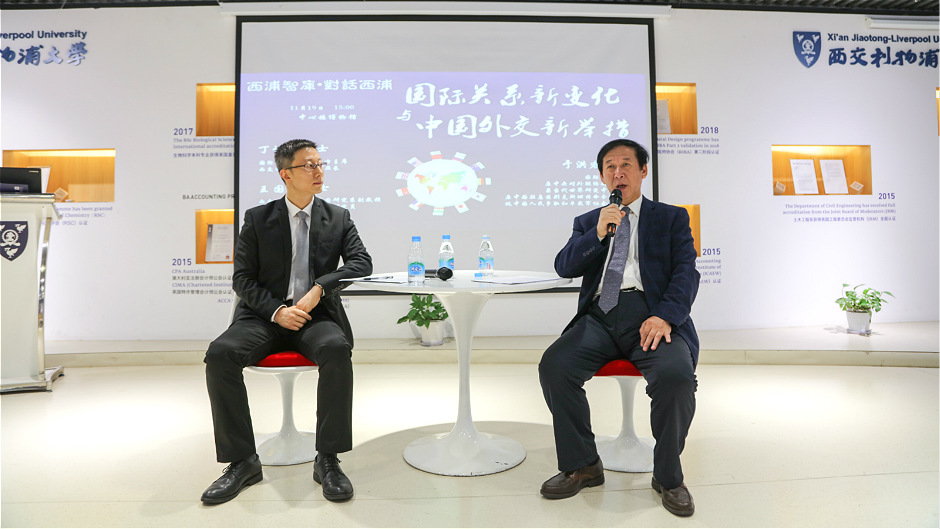15 May 2019
“Xi’an Jiaotong-Liverpool University is honoured to have played a part in the development of Suzhou Industrial Park. Today is a chance for us to come together to look at the issues the Park has faced during its 25-years history and explore new opportunities as we look forward to its bright future.”
These are the words of XJTLU Vice President, Dr Yimin Ding, who spoke at the sixth XIPU Dialogue event, which focussed on the development of Suzhou Industrial Park (SIP), the district where the University is located.
Hosted by the University’s think tank – the XIPU Institution – the event saw a number of academics and government representatives come together to explore the China-Singapore cooperation model with Professor Yuanli Lü from the Department of Public Management at the College of Management in Shenzhen University, director of the Centre of Singapore Studies at Shenzhen Universityand Weiqi Shen, director of the Research Office at SIP Administrative Committee, delivering keynote speeches.

Professor Lü (pictured above left) pointed out that the SIP was the result of successfully transplanting of the experience of Singapore into China, which integrated Singaporean characteristics into a Chinese environment.
“SIP was established at the perfect time with the right background conditions to use to its advantage,” he said.
“Although my research tends to focus on Singapore’s influence in Shenzhen, I believe the industrial park in Suzhou has the closest connection to Singapore in China.”

With years of working experience at the forefront of China-Singapore cooperation, Shen (pictured below) shared his in-depth knowledge about the collaboration between the two countries, as well as stories about how the SIP was established and developed.
“SIP would never be what it is today without the efforts made by the former leader of China Deng Xiaoping,” he said.
“At the end of the 1970s, Deng Xiaoping visited Thailand, Malaysia and Singapore, and he was deeply impressed by what he saw in Singapore – the last stop of his tour.

“He decided to learn from the Singaporean model in carrying out reform and opening up back in China.”
A subsequent tour Deng Xiaoping to southern China that marked a turning point for both the country and its governance pattern, according to Shen.
“In his speeches during the tour, Deng mentioned Singapore many times and administrators in Suzhou saw this as a great opportunity for development in their city,” Shen said.
“It is by seizing this opportunity that Suzhou underwent unprecedented changes and later stood out as one of the fastest growing cities in China.
“SIP was built where Suzhou Aquatic Plant Production Base used to be – one of the most remote and backward regions in Suzhou. Today, with imagination and innovation, this field has sprung to life again.”
Shen also explained what was involved in the process of establishing the China-Singapore cooperation in the SIP. He said both government agencies and businesses played separate but important roles in the development and ongoing management of SIP.
“Twenty-five years after its establishment and all of SIP’s major economic indicators have reached an advanced level by international standards,” he said.
After the two speakers’ presentations, Dr Ding (pictured below) raised a question about the future of bilateral cooperation.

“China is rapidly developing just as the world is drastically transforming. Accordingly, the China-Singapore cooperation model is also constantly changing. What does this bilateral cooperation look like in the new era?” he said.
Shen answered by stating the current bilateral cooperation between China and Singapore in SIP was based on a strong framework that was still flexible enough to adapt to shifting demands and environments.
“The cooperation by nature must adapt and shift to changing circumstances, as it has done since the start of SIP’s existence,” he said.
“We have moved from ‘how to boost development at home by making use of funds, technologies and talents from abroad’ at the initial stage to urban governance at the current stage.
“Going forward we will focus on building world-class high-tech industrial parks of the future. Our cooperation is always keeping up with the times.”
XIPU Dialogue is hosted by the XIPU Institution, which was established in October 2017 with financial support from XJTLU, the Suzhou Municipal Government and SIP. The XIPU Institution also holds the XIPU Forum and publishes the XIPU Institution Report on a regular basis.
Translated by Yiling Yu; edited by Rosanna Galvin
Photos by Bingbing Zhang
15 May 2019
RELATED NEWS

Event explores reform and opening up in China and Suzhou
The reform and opening up of China and its impact on Suzhou was the topic of the fifth XIPU Dialogue, hosted by Xi’an Jiaotong-Liverpool University’s think t...
Learn more

China and the world need each other says former ambassador
“Were it not for great changes in international relations, Suzhou Industrial Park would not be what it is today, neither would Xi’an Jiaotong-Liverpool Unive...
Learn more








